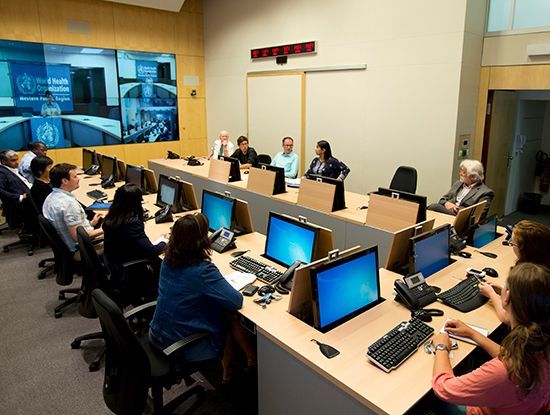
This course on WHO Standard Operating Procedures (SOPs) for Emergencies is designed for personnel who will be assigned by WHO to go on deployment in response to health emergencies. It covers all the essential areas of WHO administrative procedures in response to health emergencies.
Photo credit: WHO / Christopher Black
Language: English
Not disease specific
Course information
This course is also available in the following languages:
Overview
The objective of this course is to provide high-level information and contextual understanding of WHO Standard Operating Procedures (SOPs) for Emergencies.
We will explore a range of topics, ranging from the Emergency Response Framework (ERF), to planning, grants and finance, procurement, risk management, rosters and deployment, and ethics.
Each module within this course is standalone. Therefore, you can take the modules in any order – with the exception of the Course Review. The Course Review is a question-based revision module that recaps the content covered in modules 1 to 18.
The target audience for this course is personnel who will be assigned by WHO to go on deployment in response to health emergencies.
Learning objectives
By the end of this course, you will be able to:
- Describe the content of the WHO SOPs for emergencies;
- Explain the key concepts of WHO SOPs for emergencies in a variety of subject areas;
- Apply the SOPs for emergencies and relevant tools for solving administrative problems in emergency settings.
Course duration
Approximately 6.5 hours.
Certificate
A Record of Achievement certificate will be available to participants who score at least 80% in the Course Review assessment. Participants who receive a Record of Achievement can also download an Open Badge for this course. Click here to learn how.
Course contents
Course Introduction:
Welcome to this course on WHO Standard Operating Procedures (SOPs) for Emergencies. This course is introduced by Dr Mike Ryan.Module 1: WHO’s Role in Emergencies and Emergency Response Framework :
In this module, we learn about WHO’s role in emergency response and explore the Emergency Response Framework (ERF). This module is split into four units.Module 2: Introduction to SOPs for Emergencies:
In this module, we explore the WHO SOPs for emergencies. We will look at its context and its importance. We will then walk you through the 10 key sections of SOPs for emergencies and how to activate them.Module 3: Delegation of Authority during Emergencies :
In this module, we will explore the policy of Delegation of Authority (DOA) during emergencies and its operationalization in GSM (Global Management System).Module 4: Planning for Emergencies:
In this module, we explore planning considerations for emergencies.Module 5: Grant and Finance during Emergencies:
In this module, we look at policy considerations for grants and finance for emergencies.Module 6: Procurement for Emergencies:
In this module, we will look at the procurement process for emergencies.Module 7: FENSA During Emergencies – Engagement of Non-State Actors:
In this module, we look at the Framework of Engagement with Non-State Actors (FENSA), and consider its purpose, risks and benefits.Module 8: Risk Management in Emergencies:
In this module, we will look at risk management in emergencies.Module 9: Human Resources for Emergencies:
In this module, we will look at HR processes for emergencies, including deployment procedures, roster management and surge support.Module 10: Ethics and Emergencies:
In this module, we look at WHO’s Code of Ethics and Professional Conduct, Prevention of Sexual Exploitation and Abuse (PSEA) and Social Media Policy. We will consider the significance of adhering to these ethical principles in an emergency context.Module 11: Introduction to OSL:
This module will introduce Operation Support and Logistics (OSL) and outline its role in the Incident Management System (IMS).Module 12: OSL and Logistics Management:
In this module, we will learn about the OSL standard workflow, strategic response plan, and the concept of operations (CONOPs).Module 13: Fleet Management:
This module will provide you with an overview of OSL fleet management in emergencies.Module 14: IT in Emergencies :
This module will explore IT considerations in emergencies, including satellite devices and the field office network.Module 15: Office and Camp Set Up:
In this module, you will explore the humanitarian aspects of OSL’s role in an emergency response, and the considerations for establishing a field office.Module 16: Emergency Supply Chain Management:
In this module, we will explore the role of the WHO OSL supply unit and principles of supply chain management (SCM).Module 17: Fixed Assets Management:
In this module, we will learn about WHO procedures for fixed asset management in an emergency response.Module 18: OSL and VHFs:
In this module, we will explore OSL’s role and responsibilities in the response to an outbreak of Viral Haemorrhagic Fevers (VHF).Course Review:
This is a revision module for the SOPs for Emergencies course.
Enroll me for this course
Certificate Requirements
- Gain a Record of Achievement by earning at least 80% of the maximum number of points from all graded assignments.